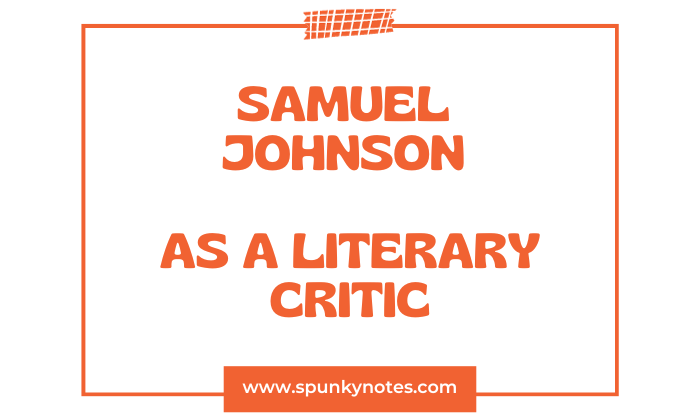Q. Discuss Samuel Johnson as a literary critic.
Introduction
Old classics inspired many writers during the Neoclassical period in English literature. Among them, John Dryden, Alexander Pope, and Samuel Johnson were some of the most notable critics.
John Dryden and Alexander Pope set the basic rules for Neoclassical criticism. They focused on rules, order, and the imitation of classical models. In contrast, Samuel Johnson had a different way of looking at things. He brought a new and unique approach to literary criticism.
Samuel Johnson brought a distinct approach. As a pivotal figure in the 18th century, Johnson’s critiques were not just rooted in Neoclassical principles but also encompassed a broader moral and humanistic perspective.
Unlike Dryden, who was keen on establishing literary standards, and Pope, who often weaved criticism into his poetic satires, Johnson combined rigorous analysis with a profound understanding of human nature and morality.
Significant Contributions to Literary Criticism
Samuel Johnson, a renowned figure in English literature, made profound contributions to literary criticism. Here are some of his key contributions:
- Preface to Shakespeare
- The Rambler
- The Lives of the Poets
- A Dictionary of the English Language
1- Preface to Shakespeare
One of Johnson’s seminal works in literary criticism is his “Preface to Shakespeare,” published in 1765. Samuel Johnson wrote the “Preface to Shakespeare,” partly to counter Voltaire’s criticisms of Shakespeare.
While Voltaire, a French critic, criticized Shakespeare for his lack of adherence to classical norms, Johnson defended Shakespeare’s genius and portrayal of human nature.
In this comprehensive critique, Johnson extols Shakespeare for his unparalleled ability to depict human nature in all its multifaceted complexity.
While he admires Shakespeare’s genius, Johnson does not hesitate to point out areas where the Bard diverged from the classical unities, a framework held in high regard during Johnson’s time.
2- The Rambler
Beyond his critique of Shakespeare, Johnson’s essays in “The Rambler,” further solidify his stature as a literary critic. The Rambler is a set of essays by Samuel Johnson from the 18th century. It is not just a book, but a periodical.
A periodical is a publication that comes out regularly, like a magazine or newspaper. Instead of being released immediately, periodicals are published at fixed intervals, whether daily, weekly, monthly, or even yearly.
The Rambler” was a series of essays written in London between 1750 and 1752. It was published by John Payne and cost two pence. Readers would get a new essay twice a week. Out of the 208 essays, Samuel Johnson wrote almost all of them, missing only four.
There are a few reasons why “The Rambler” stands out. Johnson writes in a clear, direct style, making his ideas easy to grasp. The subjects he chose are timeless, making them relevant even today.
3- The Lives of the Poets
The Lives of the Poets is a work by Samuel Johnson. It is a collection in which he wrote about the lives and works of several English poets. He did not just write about their lives, but he also gave his opinions on their poetry. It makes the book both a biography and a review of literary works.
Johnson chose poets from different times. Some were from the past, and some were his contemporaries, meaning they lived during his time. By doing this, he gave readers a broad view of English poetry’s history.
The book is not just a list of facts. Johnson shared stories about the poets’ lives, challenges, successes, and failures. Johnson’s comments were sharp and insightful. He praised the poets when he felt they did well and also pointed out where they could have done better.
Another interesting thing about “The Lives of the Poets” is that Johnson included his personal opinions. So, readers do not just learn about the poets, but they also get to know Johnson’s thoughts and feelings.
4- A Dictionary of the English Language
Johnson’s “A Dictionary of the English Language” is another monumental work that cements his reputation as a critic and scholar rather than a poet. This dictionary was not just a compilation of words but also offered critiques and insights into word usage. It further emphasizes Johnson’s role as a critic and thinker.
Distinctive Features of Johnson’s Criticism
1. Moral Focus
Samuel Johnson believed that literature should teach good values. He thought that writers should guide readers to make better choices in life. When Johnson reviewed a book or a poem, he often looked for its moral message.
If a work does not have a clear moral lesson, he might not view it favorably. For Johnson, a story was not just for entertainment. It should also help readers become better people.
For example, when he discussed Shakespeare, he appreciated how the playwright showed the consequences of ambition in “Macbeth” and the dangers of jealousy in “Othello.” Johnson felt these plays served as moral warnings about unchecked desires and distrust.
2. Realism in Literature
Johnson liked stories that showed real life. He did not prefer tales that were too far from reality. For him, the best literature showed human nature as it truly is. He valued characters and plots that readers could relate to.
When a writer showed both life’s good and bad sides, Johnson appreciated it. He believed that showing real emotions and challenges made a story powerful.
He praised Shakespeare for capturing the essence of humanity in characters like Hamlet, who struggles with indecision, and King Lear, who faces the harsh realities of aging and betrayal.
3. Emphasis on Reader’s Feelings
Samuel Johnson said that a story’s actual value was in how it affected the reader’s emotions. He believed a reader’s emotional response was vital to a story’s impact. He believed a good book or poem should touch the reader’s heart.
It should make them feel something strong. Johnson saw it as successful if the work could bring readers joy, sadness, or deep thought. For him, the connection between the writer and the reader is vital.
4. Respect for Tradition
Johnson had great respect for old and classic works. He believed that there were certain rules in literature that writers should follow. These rules came from the works of ancient writers and poets.
Johnson felt that these classics set the standard for good writing. While he was open to new ideas, he always compared them to the standards set by the classics.
Johnson’s reverence for classical literature is seen in his frequent references to ancient writers like Homer and Virgil. For instance, when discussing the epic form, he often compared contemporary works to the standards set by “The Iliad” and “The Aeneid,” emphasizing the timeless value of these ancient epics.
5. Openness to Innovation
Even though Johnson loved classic works, he was open to new ideas. He believed writers should always try to improve and develop fresh stories.
However, he also felt that new ideas should have a base in tradition. For Johnson, the key was to balance the old and the new. He appreciated innovation but wanted it to respect the values of classic literature.
For example, he praised Milton’s “Paradise Lost” for its inventive approach to the biblical story of Adam and Eve. Though the story deviated from classical epics in many ways, Johnson acknowledged Milton’s genius in crafting a new kind of epic that was both innovative and deeply rooted in tradition.
Dr. Johnson: More a Critic than a Poet
While recognized for various literary contributions, Samuel Johnson is often remembered more for his critical analyses than his poetic endeavors.
His critical writings’ depth, consistency, and influence overshadow his poetic works in many ways. Here is a breakdown explaining why Johnson is considered more a critic than a poet:
1. Volume and Impact of Critical Works
Johnson’s critical writings, particularly his essays and reviews, are vast. His “Preface to Shakespeare” and “The Lives of the Poets” are seminal works in literary criticism.
These writings not only evaluated the works of other authors but also set benchmarks for literary evaluations. The influence and reach of these critical writings have endured, making them foundational texts for literature students even today.
2. Poetry: Not His Primary Legacy
While Johnson did write poems, such as “The Vanity of Human Wishes” and “London,” they did not have the same widespread impact as his critical works.
Although these poems are respected and studied, they do not define Johnson’s literary legacy to the same extent as his critiques.
3. Depth of Literary Analysis
Johnson’s critiques are celebrated for their depth and insight. He could dissect literary works, extracting their essence and evaluating them against classical standards and moral implications. This depth is evident across his critical writings, making them a treasure trove for literary scholars.
4. Personal Affinity
Johnson himself had a keen affinity for critiquing. He was known for his wit, sharp observations, and ability to engage in profound literary discussions. His inclinations, combined with his academic pursuits, made him naturally gravitate towards criticism.


